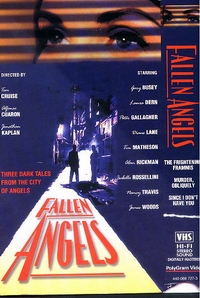
I bought, um, maybe last Summer three VHS cassettes very cheap from a thrift store. They contained all the episodes of the second season of the neo-noir TV mini-series Fallen Angels (1995) whose episodes were based on stories by famous and not so famous pulp and noir writers of bygone days. I don't know if the series has been released on DVD, but I think the purchase was a nice bargain. I don't also remember if the series was ever shown in Finland or if it came here only on video.
The series is uneven. Some of the episodes are pretty mediocre, some due to the weak original story, some due to weak directors or actors. I think the weakest is "Tomorrow I Die", based on Mickey Spillane's short story (from Cavalier, February 1956). It's just not believable and all the action these people make seem wrong. The ending is downright laughable.
Agnieszka Holland's "Red Wind", from the Raymond Chandler story (Dime Detective, January 1938), feels pretty uneven too: the artificial studio look, with the sets that you never mistake for reality, doesn't quite fit the Chandler I know, and Danny Glover as the black Marlowe - even though he's quite good - seems only a joke. The plot is what it is - I'm sure that if Holland had sent Chandler a telegram asking "Who killed who? And who doublecrossed who?", Chandler would've sent back a telegram saying "I don't know."
Some of the strongest ones include "No Escape", based on a Bruno Fischer story (from Detective Tales, January 1949) and written by Scott McGehee and David Siegel, the makers of Suture and The Deep End. The story is strong and it's easy to see why McGehee and Siegel were drawn to it - in the story, the female lead faces the same kind of obstacles as in The Deep End. In this, everything is just more violent and menacing.
Also strong is "The Professional", from a David Goodis story (as Professional Man, Manhunt, October 1953), directed by Steven Soderbergh, who's shown his love and interest for noir in several films. This one, written by Howard Rodman, plays with the idea that the professional killer of the story is actually a homosexual. The style is cool and detached, but also seems a bit too artificial for Goodis - at least the story has been taken into a timeless art deco world, that's pretty alien to Goodis. I think Rodman is going to talk about this episode at NoirCon.
Other episodes include two Cornell Woolrich versions which were okay, a Dashiell Hammett piece ("Fly-Paper", from Black Mask, August 1929, in which Christopher Lloyd makes a believable Continental Op) and a boxing story written by Evan Hunter. That was okay, too, but I don't seem to remember much of it now. The Walter Mosley piece, "Fearless", seems a bit out of context here, since it's the only new story in the bunch. It's set just after WWII, though. (The story was first published in the anthology Spooks, Spies, and Private Eyes in 1995.)
One of the weakest points in the series is actually the retro feel. Okay, the sets are nice, music is great, it's just that it's too obvious. Saxophone, guns, smoking, cocktails, the art deco lounges at hotels... it becomes a bit corny in the end. And it's corny in the epilogue that was directed by Phil Joanou - at least when you watch it nine times. What's corny is that every woman looks like their hair was made in 1995 and not in 1945 or 1955. (With the possible exception of Marcia Gay Harden in "No Escape".)
Nice try, though, and I'd really like to see another Fallen Angels: another nine episodes of classy neo-noir. Maybe you could do it now with new stories. There's lots of interesting, intriguing, electrifying, utterly satisfying noir out there, you know.
No comments:
Post a Comment